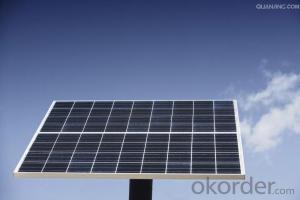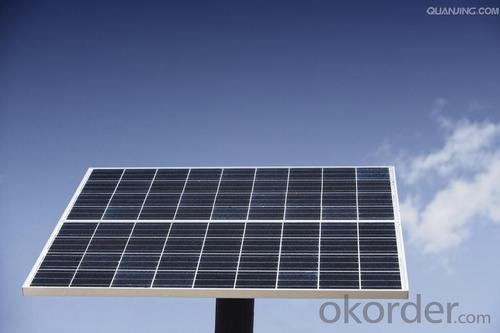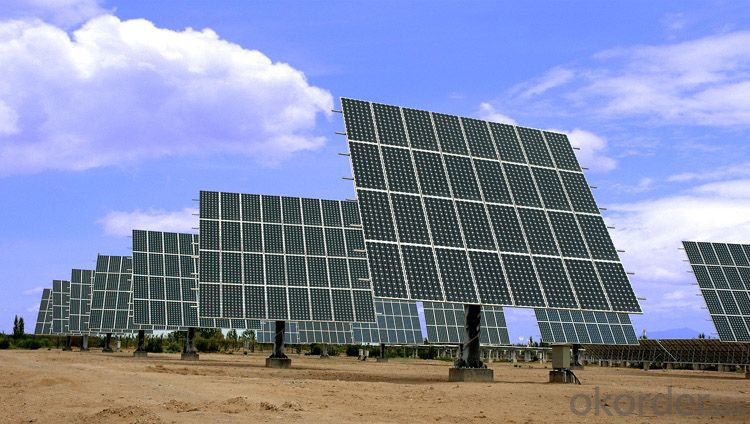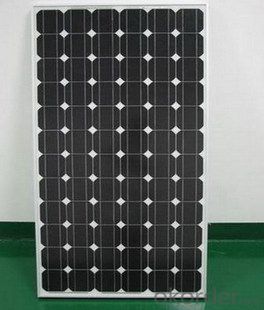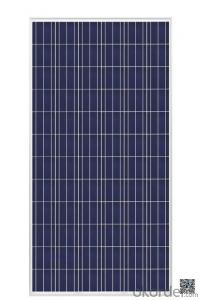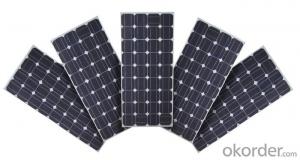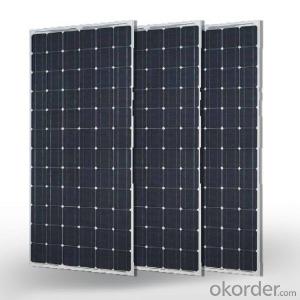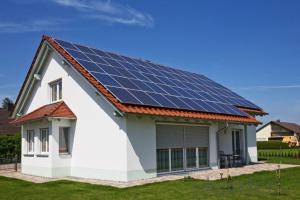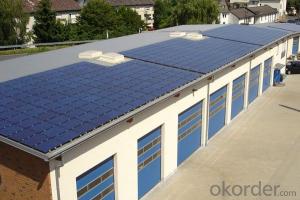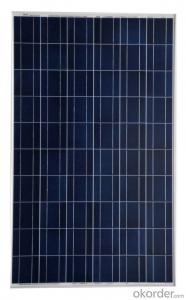High Efficiency 250W Solar Panel on Fence Solar Module
- Loading Port:
- China main port
- Payment Terms:
- TT or LC
- Min Order Qty:
- 1 pc
- Supply Capability:
- 10000 pc/month
OKorder Service Pledge
OKorder Financial Service
You Might Also Like
1.Structure of Solar Module Description
CNBM Solar's photovoltaic module is designed for designed for large electrical power requirement. It is the optimal choice for both on-grid and off-grid power systems. CNBM Solar offers high performance of power per square foot of solar array.
2.Main Features of the Solar Module
Solar Cell: High efficency crystalline solar cell. Even if under the weak light, the solar module can produce maximum power output.
Tempered glass: Anti-reflecting coating and high transmission rate glass increase the power output and mechanical strength of solar module.
EVA and TPT: Using high quality EVA and TPT to prevent destroying and water.
Strong aluminum frames to strengthen the load hold and to stand against high wind.
Junction box: Multi function junction box with water proof.
Long lifetime: ≥25 years; Less power decrease.
Good performance of preventing from atrocious weather such as wind and hails.
Resisting moisture and etching effectively, not effected by geology.
The certificate issued by international authority: UL, TUV, IEC, VDE, CE.
Quick Details
| Place of Origin: | Zhejiang China (Mainland) | Brand Name: | CNBM | Model Number: | PLM-250P-60 |
| Material: | Monocrystalline Silicon | Size: | 1650*992*40mm | Number of Cells: | 60 |
| Max. Power: | 260 | Color: | Silver,Black | Quality Certifications: | PID Free, Salt Mist,Fire Test and Ammonia Gas certifications |
| International Certifications: | TUV,MCS,UL,CEC and J-pec | OME/ODM: | Yes | Solar Cells Efficiency: | 17.2% |
| Solar Panels Efficiency: | 15.3% |
Packaging & Delivery
| Packaging Detail: | Carton boxes with pallets and air bags |
| Delivery Detail: | within 15 days after arrival of the 20% TT in advance |
3.Solar Module Images
4.Solar Module Specification
-PID Free,Salt Mist, andAmmonia gas Certifications
-Higher Efficiecny Solar Cells;
-More cost effective;
-25 years guarantee.
High efficiency mono crystalline solar panel PLM-240P-60 series
Anti-reflective coating: AR used reduce the reflectivity enhance transmittance.
Tempered Glass: Low Iron and AR coating glass increase the power output and mechanical strength of solar module. Mechanical load ≥2400Pa , transmittance ≥91.6%
EVA: Transmittance ≥91% , Adhesive Capacity >85%
Cell: 17.9% of high efficiency solar cells to sure 15.3% module efficiency
Back sheet: Using higher quality back sheet to prevent destroying and water , it’s reflectivity ≥87%, peeling strength ≥ 40N/cm.
Aluminum Frame: Anodized aluminum alloy to effectively improve the corrosion resistance and strengt.
Power range:220w-270w
| Module | PLM-235P-60 | PLM-240P-60 | PLM-245P-60 | PLM-250P-60 | PLM-255P-60 | PLM-260P-60 |
| Pm | 235 | 240 | 245 | 250 | 255 | 260 |
| Vmp | 30.64 | 30.89 | 31.29 | 31.73 | 31.92 | 32.1 |
| Imp | 7.67 | 7.77 | 7.83 | 7.88 | 7.96 | 8.1 |
| Voc | 37.18 | 37.35 | 37.42 | 37.58 | 37.73 | 37.92 |
| Isc | 8.34 | 8.38 | 8.45 | 8.49 | 8.52 | 8.64 |
Maxium system voltage 1000VDC
STC:Irradiance 1000W/m², Temperature 25°c,AM=1.5
Mechanical Characteristics:
| Cells size(mm) | 156X156 |
| Modules size(mm) | 1650X992X46 |
| No. of cells | 60(6X10) |
| Weight(KG) | 19.6 |
| No.of mounting holes | 8 |
| No.of waterspout | 16 |
Temperature Coefficient:
| NOCT | 45°C±2°C |
| Temperature coefficient of Isc | 0.05%/°C |
| Temperature coefficient of Voc | -0.33%/°C |
| Temperature coefficient of Pmax | -0.44%/°C |
| Power Tolerance | 0/+3% |
| Working temperature | -40°C to 85°C |
Qualification Test Parameters:
| Temperature cycling range | -40℃~85℃ |
| Humidity freeze, damp heat | 85%RH |
| Static load front and back (e.g. wind) | 2400 pa (50psf) |
| Front loading (e.g. snow) | 5400 pa (113psf) |
| Hailstone impact | 25mm ( 1 inch) at 23 m/s (52mph) |
Module Diagram:
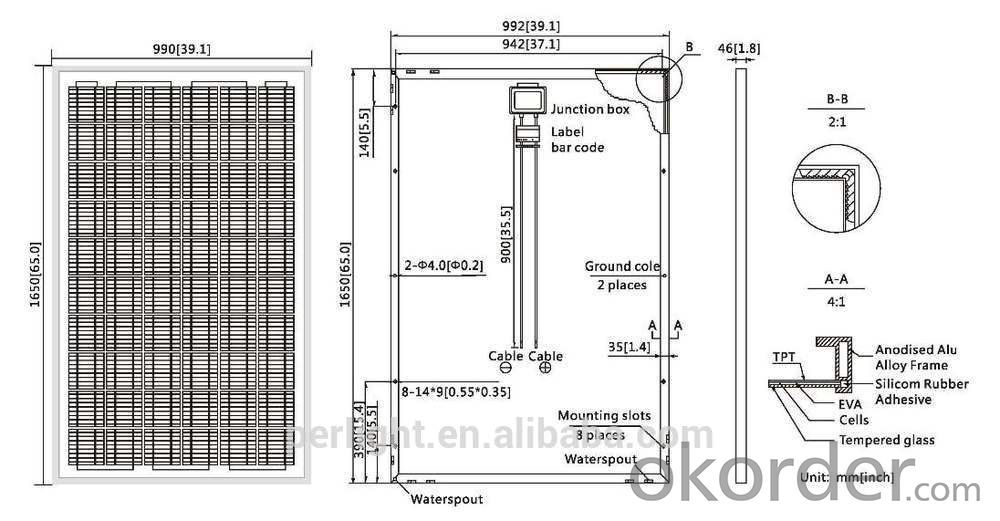
Electrical Curves:
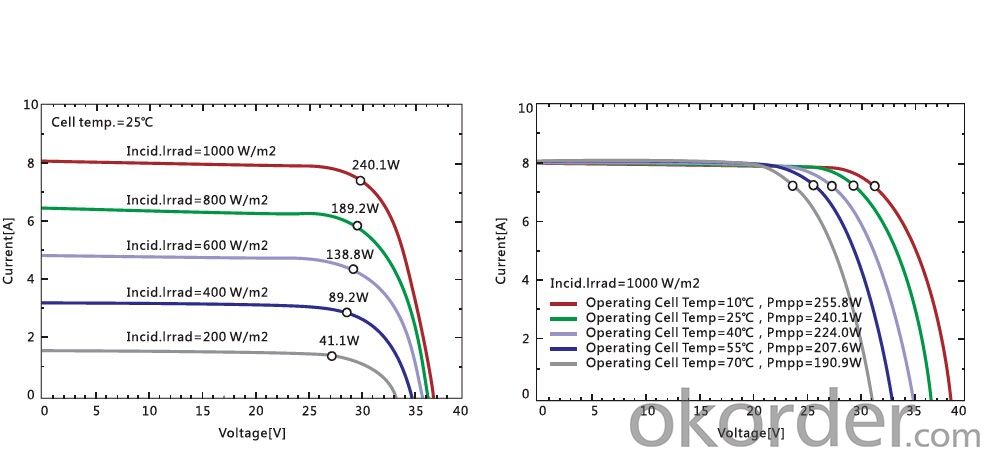
Packaging & Shipping
Package Information:
| Type | Frame | PCS/Pallet | Pallets/Container | PCS/Container |
| 40HQ 1650X992 156P 60cells | 40/46 | 23 | 28 | 784/700 |
Packaging & Shipping
Package Information:
| Type | Frame | PCS/Pallet | Pallets/Container | PCS/Container |
| 40HQ 1650X992 156P 60cells | 40/46 | 23 | 28 | 784/700 |
Our Services
Product Wattanty:
10 years for the workmanship
12 years power output no less than 90%
25 years power output no less than 80%
5.FAQ of Solar Module
1. Q: Do you have your own factory?
A: Yes, we have. Our factory located in Jiangyin city, jiangsu province.
2. Q: How can I visit your factory?
A: Before you take off from your country, please let us know. We will show you the way,or arrange time to pick you up if possible.
3. Q: Do you provide free sample?
A: Usually we do not offer free sample
4. Q: Could you print our company LOGO on the nameplate and package?
A: Yes, we can do that.
- Q: Is it really possible for me living in Denver to build and install and setup my own solar panel to help make electricity for my home?
- Sure you can build your own solar panels, people do it all the time, especially with the efficiency of PV technology accelerating. How much you spend on a system depends on how much work you are willing to do for yourself, and how much and how efficiently you consume power. You can go all the way from high-end prefab installs that will run about $50 grand to fill the energy needs for an average 3/2 suburban home. You can buy kits and install them yourself, that cuts your price down quite a lot. You can purchase the components and put together a system yourself really cheaply. You can save even more money if you buy stuff used. You could actually build solar photovoltaic panels yourself, but it is a serious pain in the behind, you will need to use copper sheets and some highschool chemistry and do a lot of experimenting, and even if you do it right you definitly won't be able to replicate the power output available in manufactured silicone photovoltaic cells. So I say don't even bother. To get an idea of what a PV system for your local area might put out, use the PV-WATTS calculator at the government Renewable Resource Data Center. To learn how to build home solar energy systems, there's a lot of good free information online.
- Q: Can solar panels be used to power a factory?
- Yes, solar panels can be used to power a factory. By installing a sufficient number of solar panels on the factory's premises, the factory can generate enough renewable energy to meet its power requirements. This can help reduce reliance on traditional power sources and contribute to a more sustainable and eco-friendly operation.
- Q: Solar panel packages have different levels of power. For instance you can get a kw system but is this kw per hour or day. How does this work?
- That means if you stick a watt meter on the output when there is maximum design sunlight on it you will get kw. If you shine the maximum design sunlight on it for hour then you get kw hour of power. In one day you get 24kw hours assuming you can get 24 hours of maximum design sunlight. Your home electric bill is typically in kw hours. At the macro level power is traded at megawatt hours.
- Q: Say if i had a 2KW system is thtat just one big solar panel or does the whole system have little solarpanels together.?
- A two KW system would be made up of a number of solar panels. Panels used in residential and commercial systems usually run in the range 50 watts to about 200 watts. There is a HUGE amount of information available on the internet about solar panels and all the components of solar electric systems. All you have to do is search on the internet under solar panel. It's very safe and easy. So just do it.
- Q: Can solar panels be installed on hiking trails or nature reserves?
- Yes, solar panels can be installed on hiking trails or nature reserves. However, careful planning and consideration of environmental impact is crucial to minimize disruption to the natural surroundings and wildlife habitats.
- Q: Can solar panels be used to power a mining operation?
- Yes, solar panels can be used to power a mining operation. Solar energy can be harnessed and converted into electricity through photovoltaic panels. This electricity can then be used to power various mining processes such as crushing, grinding, transportation, and ventilation systems. However, the suitability of solar panels for powering a mining operation would depend on factors such as the required energy demand, availability of sunlight, space for installation, and the feasibility of integrating solar power with existing mining infrastructure.
- Q: Can solar panels be used to power a greenhouse?
- Yes, solar panels can be used to power a greenhouse. Solar panels are a sustainable and efficient energy source that can generate electricity to operate various greenhouse systems, such as lighting, heating, ventilation, and irrigation. By harnessing the sun's energy, solar panels provide a clean and renewable power supply, reducing greenhouse gas emissions and minimizing reliance on conventional energy sources.
- Q: i have a 50 watt 2 Volt solar panel..Will it can switch on directly a car head light on a sunny day??? How much head lights it can support on a bright sunny day??? if its cloudy then can it run a single Head light???? i have no batteries just want to connect a car Head light directly to solar panel.
- It should illuminate two auto headlights on a sunny day, if it really generates 50 watts at 2 V. On a cloudy day, I don't know. It depends on how cloudy it is.
- Q: I want to be more self sufficient and get solar panels for electricity in a small house any tips will help. i need to know how many watts is enough and ect.
- With a small house it may not be necessary to put solar panels in it. The wattage that is needed will not be much of a difference when using electricity.
- Q: Can solar panels be installed on schools or educational institutions?
- Yes, solar panels can be installed on schools or educational institutions. In fact, many schools and educational institutions have embraced solar energy as a sustainable and cost-effective solution for their energy needs. Installing solar panels on rooftops or open spaces of these institutions not only helps them save on electricity bills but also promotes environmental awareness and sets a positive example for students and the community.
Send your message to us
High Efficiency 250W Solar Panel on Fence Solar Module
- Loading Port:
- China main port
- Payment Terms:
- TT or LC
- Min Order Qty:
- 1 pc
- Supply Capability:
- 10000 pc/month
OKorder Service Pledge
OKorder Financial Service
Similar products
Hot products
Hot Searches
Related keywords
